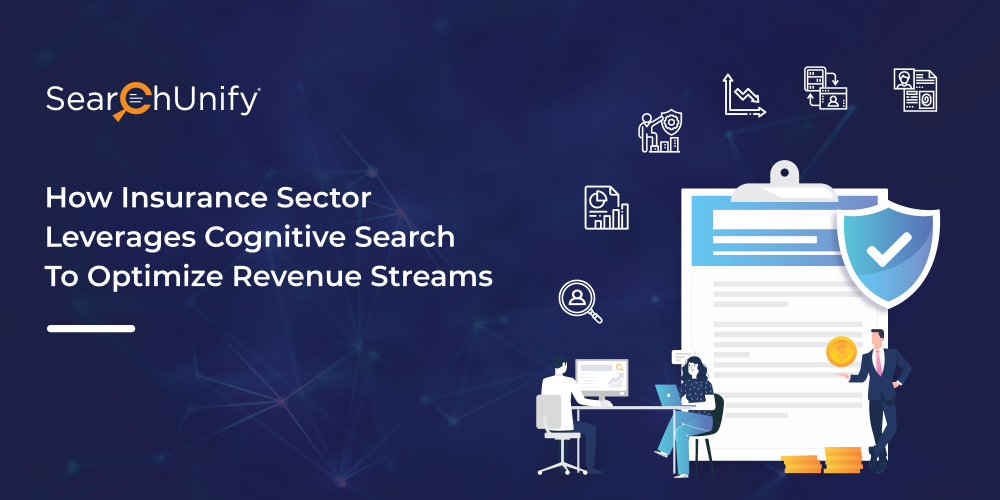
Leading banks, insurance companies, and other financial institutions are data-driven organizations. From helping underwriters gain insights into customer profiles, assessing risk and detecting fraud to providing personalized marketing campaigns, insurers are highly dependent on data.
Goes without saying that capturing and then manually processing all this data can be cumbersome. And even then there is a possibility of human error which can set the business back by millions of dollars. This is why industry stalwarts are actively looking for solutions to avert risks and automate data collection and analysis.
This is where cognitive search steps in and delivers way more than organizations asked for. Let’s see how:
1. Know Your Customers
Knowing your customers is of paramount importance when it comes to insurance companies. Even the slightest negligence in identifying the policy applicant can cost more.
Since insurance companies are data-intensive organizations, manually scrolling through multiple silos could be a daunting task. To save you from all the hassle, a cognitive search tool provides a 360-degree unified and searchable view of customer information, including customer profile, payment history, number of claims, etc.
ML-powered cognitive engines unify data from multiple digital interaction points to rapidly update you with whatever information you need to know about a customer. This way you refrain from selling policies to money launderers and fraudsters.
2. Personalize Experience To Increase Revenue
Customization is the new black. Personalized campaigns give a financial edge over the competitors. But, is your organization giving in to the whims of policyholder demand to their own detriment?
Bridging the gap between service provision and customer expectation is the cognitive search tool. It plays a significant role in providing insights into customer behavior, including age, demographics, medical history, etc. By analyzing this historical data, insurers suggest the best products for the customer.
With a 360-degree view of the customer profile, insurers turn the corner and improve cross-selling and up-selling.
3. Detect Fraud & Prevent Money Laundering
For years, fraudulent activities have been a major concern in the insurance sector. Insurance executives have to deal with multiple challenges, ranging from claim frauds, subrogations, and settlement to litigation. Thanks to the inefficient data analysis that hampers fraud detection.
To help you overcome this challenge, cognitive search leverages predictive machine learning algorithms to alert you about any payment defaults. It maps relationships between customers, bank accounts, financial transactions, and many other data points; and analysts use a combination of this relationship maps and timeline analysis to detect unusual patterns and payment anomalies.
4. Accelerate Claim Processing
Claim processing is a tedious task. It requires checking claim requests for adequate information, validation, justification and authenticity. Perhaps a reason why insurers are finding ways to digitize the process.
With the predictive analytics of cognitive search, you can digitize the claim workflow in multiple ways. For instance, you can calculate how much a claimant should be paid for their claim requests. This makes claim processing less error-prone.
Cognitive search engines also speed up claim adjustments leveraging NLP and its text mining capabilities. The algorithm can identify patterns in text data and share updates about duplication of information on the claim or whether it has been pre-authorized. By and large, cognitive search helps you process claims faster and provide customers with fast payouts.
5. Enable Product Pricing & Actuarial Analyzing
Over the last few years, insurance companies have witnessed the introduction of new regulations. These new rules and regulations demand more extensive financial modeling for insurers.
Cognitive search engines can discover predictors in claims activity using unsupervised machine learning. The information gathered further helps underwriters to perform risk scoring to optimize product pricing.
Since cognitive solution also gives insights into the customer profile, financial spending, risk history, customer creditworthiness, etc; underwriters have sufficient data in hand from all relevant documents to perform actuarial valuation.
6. Curtail Lapses to Reduce Churn Rate
High lapse of insurance policies is a major challenge for insurance companies. This further leads to a high degree of financial losses for policyholders, general dissatisfaction and an increased churn rate.
A cognitive search engine is the best solution to help you with this challenge. By proactively identifying policies that are likely to lapse, it helps you in timely reaching out to respective insured about maintaining the policy.
It would be alluring for insurers to believe that insured are largely in the driver’s seat, and proactive communication is not just fuelling loyalty, it’s fuelling revenue streams.
7. Optimize Self-Service Adoption
Chatbots are the new holy-grail of improving brand presence and customer engagement. Insurers incorporate one to their system to shift processes from reactive to proactive. Search-powered bots help in resolving customer queries regarding policies and premiums, viewing claims, claims status, etc.
To boost cross-selling and up-selling agents need to be agile, innovative and responsive to evolving customer needs. Since search-powered chatbots leave no stone unturned to handle L1 insurance queries, insurers can spend more time on high-value engagements, improving overall customer experience.
If you are looking for one such solution, then the hunt is over. SearchUnify fits the bill! It helps you reduce fraud and optimize revenue streams. For a hands-on-experience, request a free demo today.











